Facial tattoos have been a part of human culture since ancient times. They were not only used for decorative purposes but also had symbolic meanings attached to them. The meaning and designs of facial tattoos vary across different cultures and tribes. While some people choose to get a facial tattoo as a way of expressing their personal beliefs or identity, others do it for aesthetic reasons. In this article with Impeccable Nest, we will explore the meaning of facial tattoos and the different designs that exist.
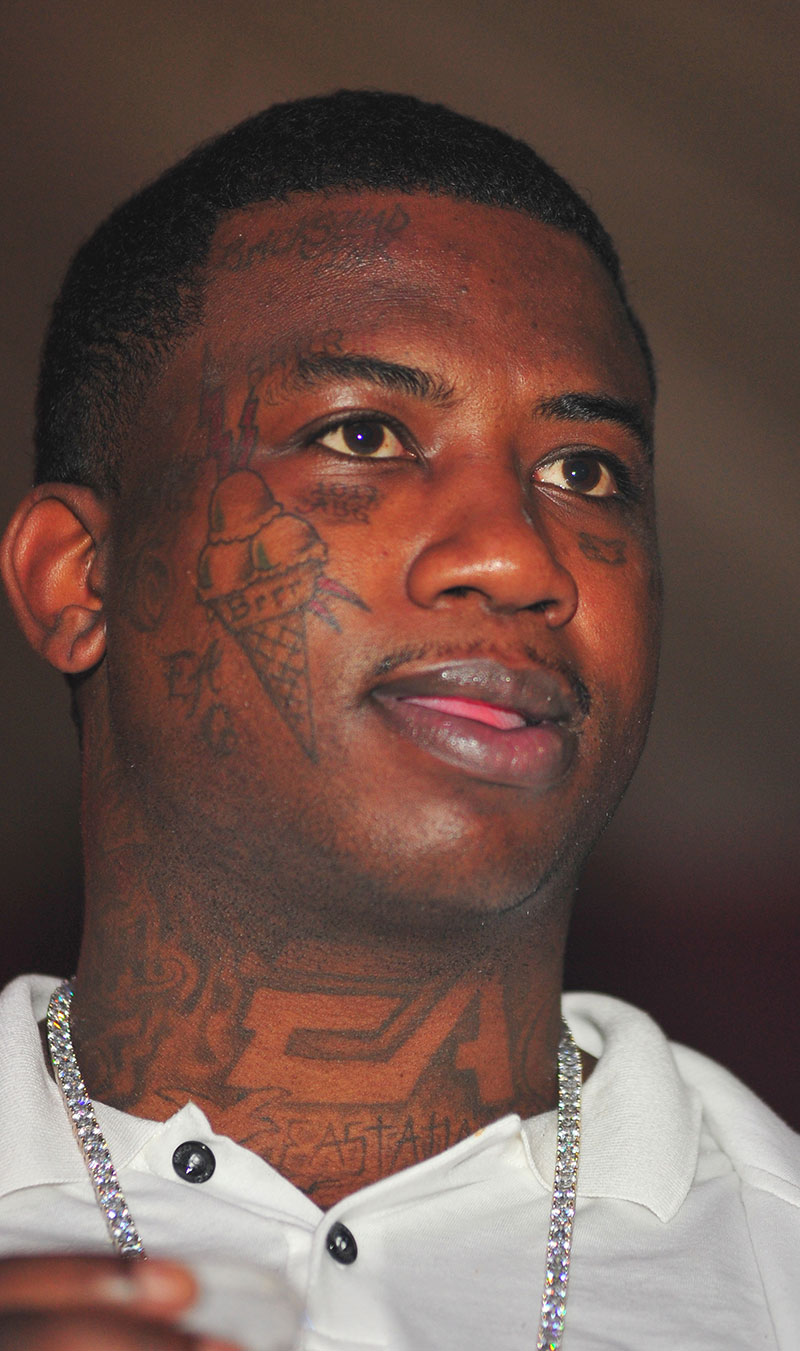
The Cultural and Symbolic of Facial Tattoos
Facial tattoos have a deep cultural significance in many societies. They are used to mark various rites of passage, such as reaching adulthood, marriage, or initiation into a new religious or social group. In some cultures, facial tattoos are reserved for specific roles within society, such as warriors or shamans, and are seen as a sign of bravery or spiritual power.
One example of a culture where facial tattoos hold significant cultural meaning is the Maori people of New Zealand. The Maori have a long tradition of facial tattooing known as “tā moko,” which was done using chisels made from bone or sharpened teeth. Each tattoo design had a specific meaning, such as ancestry, status within the tribe, or connection to the spiritual realm. In Maori culture, facial tattoos were a source of pride and a way to honor one’s heritage.
In other parts of the world, facial tattoos are associated with criminality or rebellion. This is particularly true in Western cultures, where facial tattoos are often seen as a sign of deviance or nonconformity. However, attitudes towards facial tattoos are changing, and many people now see them as a legitimate form of self-expression.
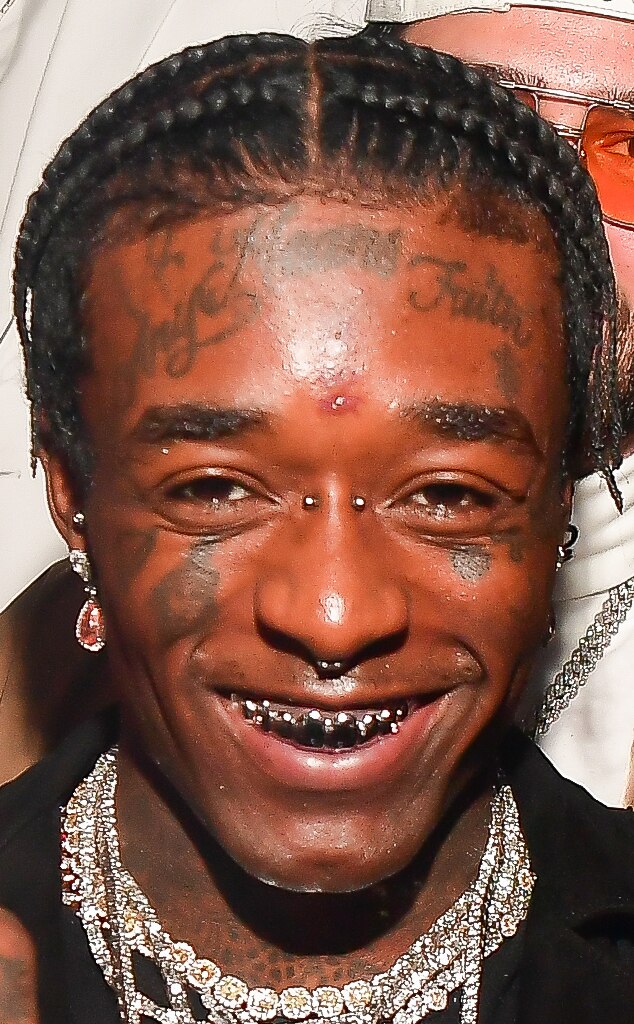
Meaning of Facial Tattoos: Unveiling the Symbolic Power
Facial tattoos, like tattoos on other parts of the body, can have various meanings and significance depending on the individual and their cultural or personal context. Here are some common meanings and reasons people might have facial tattoos:
Cultural and Traditional Significance
Facial tattoos are a form of body art that involves creating permanent designs or patterns on the face using ink. This practice has been around for centuries and has been prevalent in many cultures across the world. The meaning of facial tattoos varies from culture to culture, with each having its unique significance.
In some cultures, facial tattoos are seen as a symbol of tribal affiliations. For example, the Maori people of New Zealand have a rich tradition of facial tattoos called moko. The moko is a sacred art form that has been passed down through generations of Maori artists. The designs and patterns used in moko represent the wearer’s heritage, genealogy, and life experiences. Each line and curve in the moko tells a story, making it a deeply personal and meaningful representation of the wearer’s identity.
Facial tattoos may also serve as a rite of passage in some cultures. In ancient Polynesian societies, young men would receive facial tattoos as a symbol of their transition into adulthood. These tattoos were not only a sign of maturity but also demonstrated the individual’s bravery and ability to endure pain. Similarly, among the Berber people of North Africa, women would receive facial tattoos as a sign of their marriageability and readiness for marriage. The tattoos were seen as a mark of beauty and fertility, attracting potential suitors.

Facial tattoos may also denote social status in certain communities. In the Ainu culture of Japan, facial tattoos were worn by women of high social standing as a sign of their prestige. The tattoos were intricate and covered the entire mouth, chin, and cheeks. They were seen as a symbol of wealth and beauty, reflecting the wearer’s status within the community.
However, it is worth noting that the cultural significance of facial tattoos is not universally accepted. In some societies, facial tattoos are stigmatized and associated with criminality or deviance. In these communities, facial tattoos may be seen as a barrier to employment or social integration.
In recent years, facial tattoos have become more common in mainstream culture. Many people choose to get facial tattoos for personal or aesthetic reasons, without any cultural or traditional significance. However, it is essential to recognize the cultural and historical significance of facial tattoos and understand their meanings before getting one.
In conclusion, facial tattoos have a rich history and cultural significance in many communities around the world. From tribal affiliations to social status, these tattoos are deeply personal and meaningful to those who wear them. While facial tattoos may not be universally accepted, they continue to be an important part of many cultures’ heritage and identity.
Personal Expression
Facial tattoos are a form of body modification that involves the permanent application of ink onto the skin of the face. This type of tattooing is a relatively uncommon practice, as many people tend to opt for tattoos on less visible parts of their bodies.
For those who do choose to get facial tattoos, the reasons behind it may vary. Some individuals view facial tattoos as a form of self-expression that allows them to showcase their unique identity and creativity. Tattoos can be used to tell stories, express emotions, or represent important life events, and getting one on the face can be seen as a bold way to make a statement about oneself.
In some cases, facial tattoos can also hold cultural or religious significance. For instance, certain indigenous communities in New Zealand have a long tradition of facial tattooing known as Ta Moko. These tattoos are considered to be a symbol of cultural identity, with each design representing a person’s lineage, social status, and personal history.
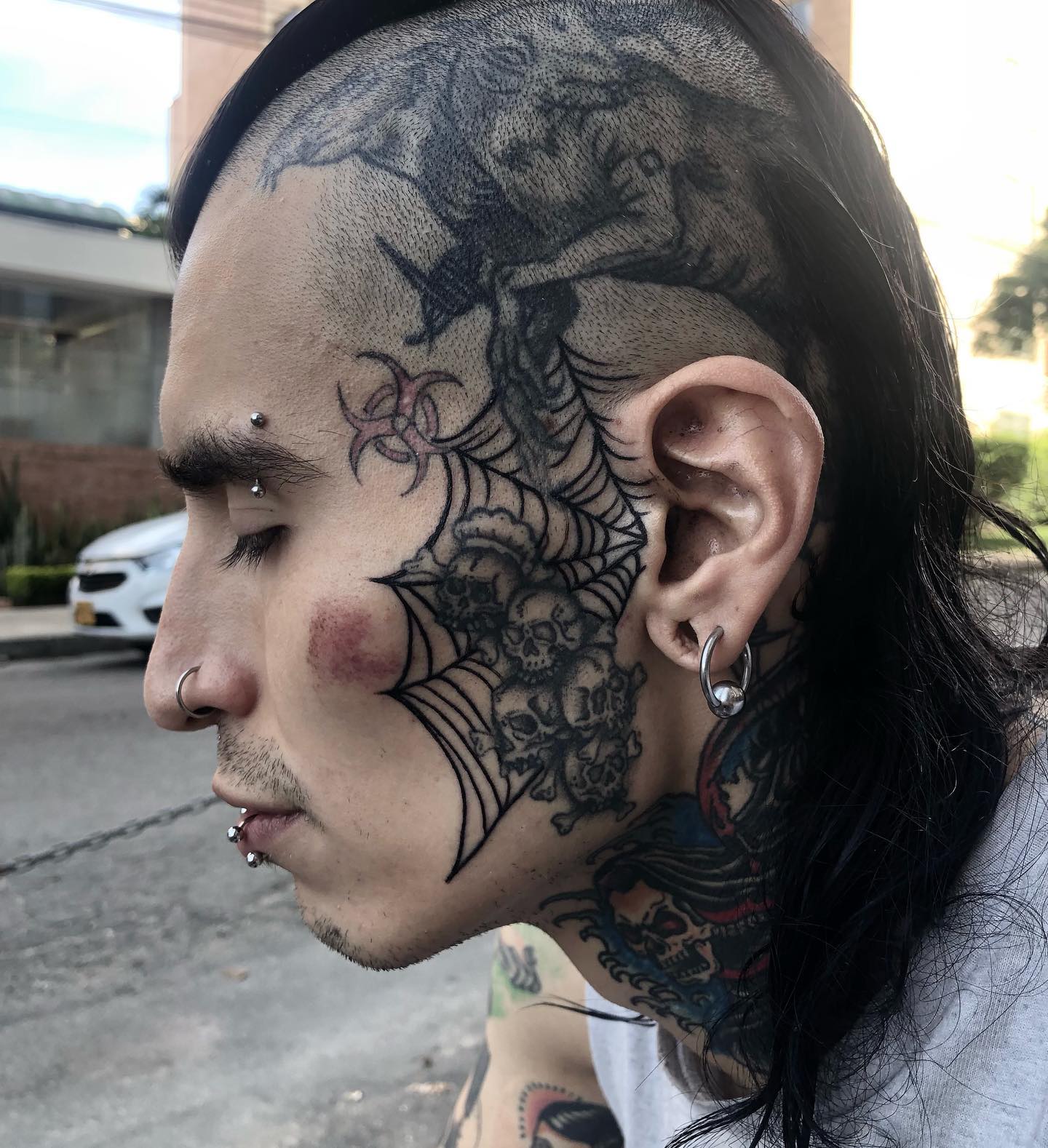
However, it is worth noting that facial tattoos can also carry negative connotations in certain cultures. In some societies, facial tattoos are associated with criminal activity or gang membership. This stigma can make it difficult for individuals with facial tattoos to find employment or integrate into mainstream society.
Furthermore, getting a facial tattoo is a significant commitment, as it is a highly visible and permanent form of body modification. Unlike other types of tattoos, which can often be covered up with clothing or makeup, facial tattoos are always on display. This means that individuals who choose to get a facial tattoo must be prepared to deal with the potential consequences and reactions from others.
Overall, the meaning of facial tattoos can vary greatly depending on the individual and their cultural or personal background. While some people view it as a form of self-expression and individuality, others may see it as a sign of rebellion or deviance. Regardless of the motivations behind getting a facial tattoo, it is important for individuals to carefully consider the potential risks and benefits before making such a permanent decision.
Commemoration
Facial tattoos have been a part of human culture for centuries, with different meanings and interpretations across various societies. Historically, they have been used to signify status, identity, or achievements. In some cultures, facial tattoos were seen as a form of beautification or adornment, while in others, they represented rites of passage or were used as a punishment.
In modern times, facial tattoos have become more popularized, especially among subcultures such as the punk rock and heavy metal scenes. However, the practice remains controversial in many parts of the world. In some professions, such as the corporate world or military, facial tattoos are still considered taboo and may even be grounds for dismissal.
Despite the stigma surrounding facial tattoos, many people choose to get them as a way to express their individuality or as a permanent reminder of something important in their lives. For instance, some individuals may choose to get a tattoo on their face to commemorate the loss of a loved one or to honor a cultural heritage. Others may choose to get a facial tattoo as a way to mark a significant personal achievement, such as overcoming an addiction or completing a challenging physical feat.
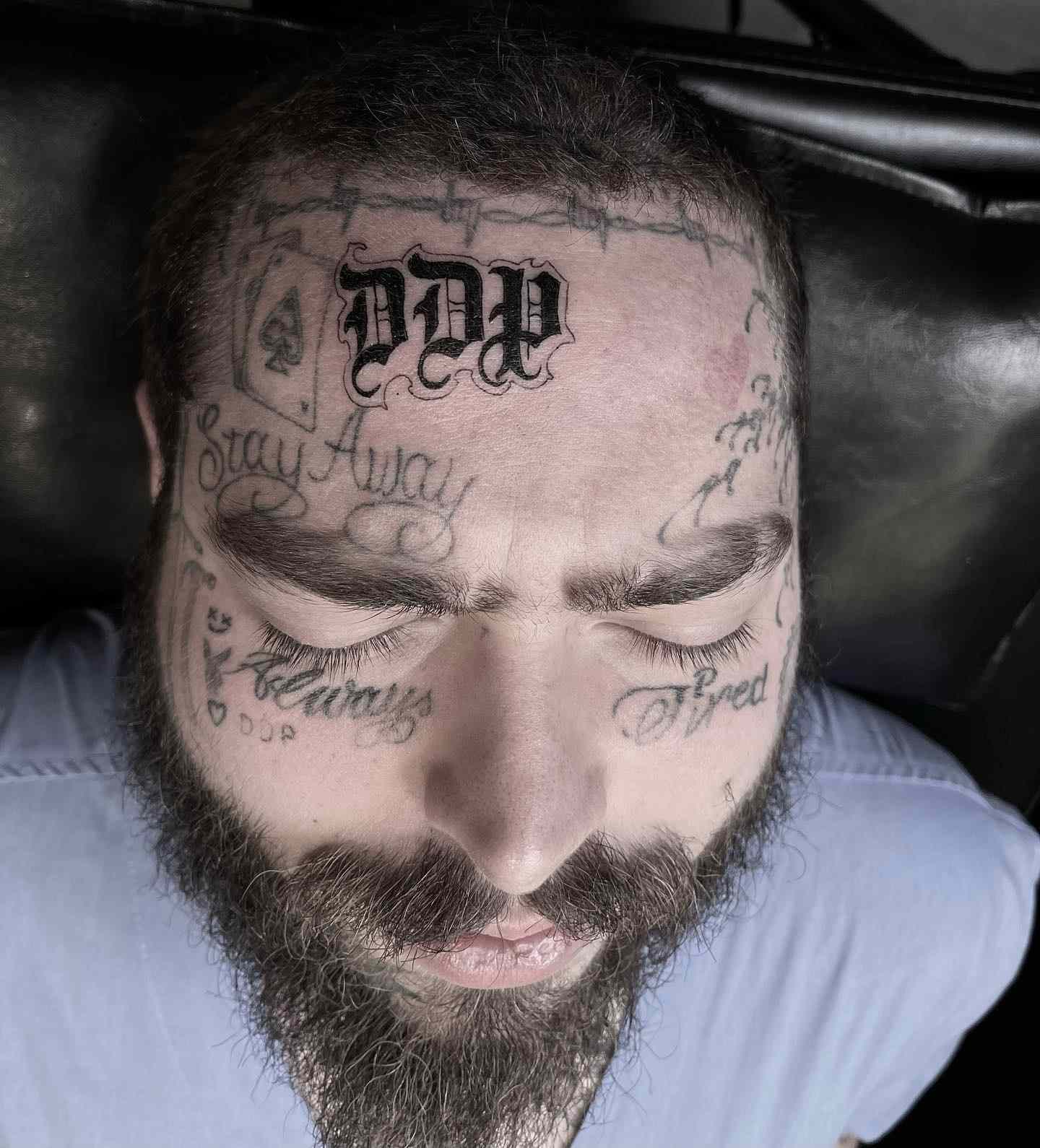
Another reason why someone may choose to get a facial tattoo is to reclaim their body after experiencing trauma or abuse. In this situation, the tattoo can serve as a symbol of ownership and control over one’s own body.
It is essential to note that facial tattoos are not for everyone, and getting one should be a well-considered decision. Facial tattoos are permanent, and the process of removing them can be painful, time-consuming, and expensive.
In conclusion, facial tattoos can hold significant meaning and symbolism for the individual wearing them. While there may be societal stigmas attached to facial tattoos, ultimately, it is up to the individual to decide how they want to decorate their body. Whether it is to commemorate a significant event, person, or moment in life, or as a form of self-expression, facial tattoos can serve as a powerful way to convey personal meaning and identity.
Spiritual or Religious Belief
Facial tattoos have been a part of various cultures and religions for centuries. In some societies, facial tattoos are considered to be a rite of passage or a symbol of social standing. However, in other cultures, the meaning behind a facial tattoo goes much deeper than that. These tattoos can hold spiritual or religious significance, representing a connection to one’s faith or belief system.
One such culture that holds facial tattoos in high esteem is the Maori culture of New Zealand. The Maori people have a long-standing tradition of facial tattoos, which they call “tā moko”. Tā moko is a sacred art form that represents a person’s genealogy, social status, and personal identity. Each tattoo design is unique to the individual, and the intricate patterns and symbols used in the tattoos carry specific meanings.
In Maori culture, facial tattoos were primarily reserved for men, who wore them as a mark of their warrior status. However, women also had their own unique form of facial tattoos, which were more subtle and mainly focused on the lips and chin area. The designs of these tattoos were created by skilled tattoo artists, who were also highly respected members of the community.
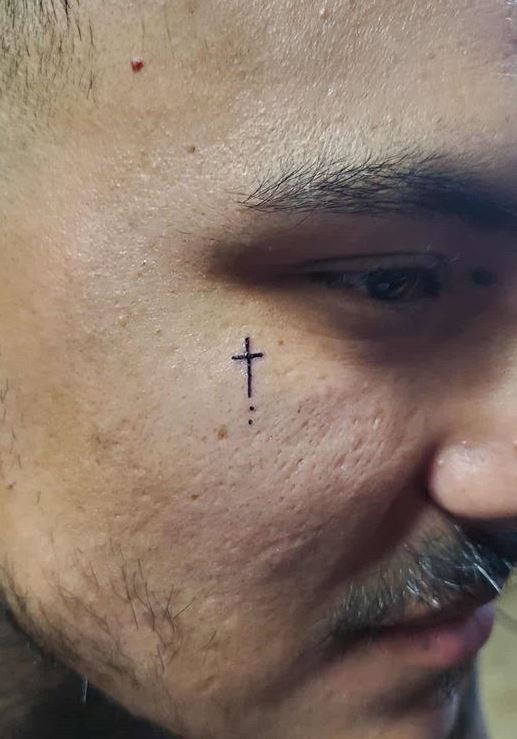
Another culture that values facial tattoos is the Polynesian culture. Similar to the Maori people, the Polynesians have a rich history of facial tattoos, which they refer to as “tatau”. In Polynesian culture, tatau was seen as a mark of courage and strength. It was believed that the process of receiving a tatau tattoo was painful and required the individual to endure immense physical and mental discomfort, proving their strength and bravery.
The symbols and patterns used in Polynesian tatau tattoos also held deep spiritual meanings, representing an individual’s connection to their ancestors and the supernatural world. Each tattoo design was unique to the individual, and the placement of the tattoo on the face would dictate its meaning.
In some religions, facial tattoos are also considered to hold spiritual significance. For example, in Hinduism, facial tattoos are often associated with the worship of Lord Shiva, who is regarded as the destroyer and transformer. Devotees of Lord Shiva may choose to get a tattoo of his symbol, the “Trishul”, on their forehead, representing their connection to the deity and their devotion to his teachings.
In conclusion, facial tattoos can hold deep spiritual and religious significance, representing an individual’s connection to their culture, faith, and belief system. Whether it is the Maori people of New Zealand or the Polynesians of the Pacific Islands, these tattoos have been an integral part of various cultures for centuries and continue to be valued as an important tradition today.
Gang or Prison Affiliation
Facial tattoos have been around for centuries and their meanings have changed over time and across cultures. In some societies, facial tattoos were seen as a sign of wealth, status, or beauty, while in others they were used to indicate social class, occupation, or religious affiliation.
However, in modern times, facial tattoos are often associated with criminal activity. This is particularly true in the Western world, where facial tattoos have become increasingly popular among gang members and criminals.
In gang culture, facial tattoos are often used to show loyalty to a particular group or prison gang. These tattoos may include symbols or slogans that represent the gang’s identity or ideology. They may also feature specific numbers or letters that refer to the gang’s hierarchy or leadership.
Facial tattoos can also be used to indicate a person’s criminal history. For example, a teardrop tattoo under the eye is commonly associated with murder, while a spider web tattoo on the forehead may signify a long prison sentence.
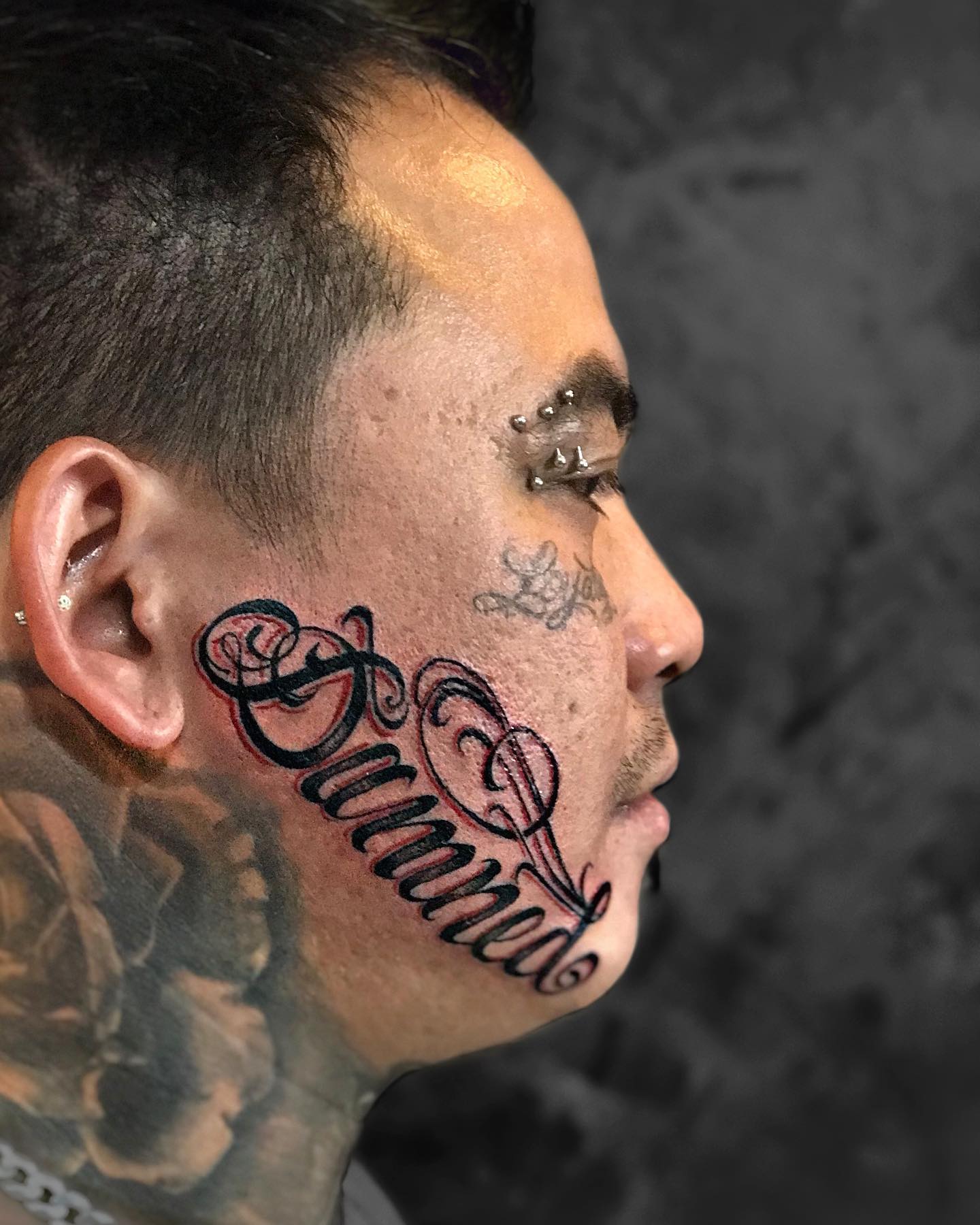
However, it’s important to note that not all facial tattoos are related to criminal activity. In some cultures, facial tattoos are still used as a form of self-expression or personal identity. For example, traditional Maori facial tattoos, known as moko, are considered a sacred art form that represents a person’s family, tribe, and life story.
Similarly, some people choose to get facial tattoos as a way of expressing their artistic creativity or individuality. These tattoos may include intricate designs or patterns that cover the entire face, or smaller tattoos that accentuate certain features like the eyebrows or lips.
Overall, the meaning of facial tattoos varies widely depending on cultural context and personal choice. While some tattoos may be associated with criminal activity, it’s important to avoid making assumptions based solely on someone’s appearance. Instead, it’s better to approach each individual with an open mind and respect for their unique experiences and identity.
Identity and Empowerment
Tattoos have been used for centuries as a form of self-expression and identity among different societies and cultures. While tattoos were once considered taboo, they have become increasingly popular and accepted in recent years. As more people embrace tattoos, they are exploring new ways to express themselves, including getting facial tattoos.
Facial tattoos are a type of body art that involves tattooing the face, head, or neck. Unlike traditional tattoos that can be easily hidden by clothing, facial tattoos are highly visible and cannot be covered up. This is because the face is one of the most prominent parts of the body, and any artwork inked on it will be immediately noticeable.
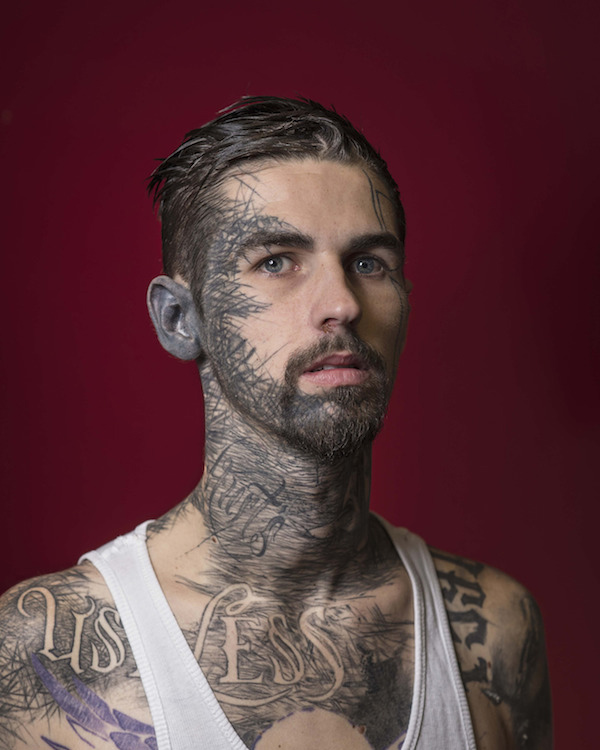
For many people, facial tattoos are a way to assert their identity and individuality. These tattoos can be deeply personal and meaningful, representing a person’s beliefs, values, or life experiences. Some people choose to get facial tattoos to honor their heritage, while others use them to commemorate an important event or milestone in their lives.
In some cases, facial tattoos can also be a way to challenge societal norms or expectations. For example, people who belong to marginalized communities may use facial tattoos as a form of resistance against mainstream culture. By getting a facial tattoo, they can assert their belonging to a particular subculture or community and show their pride in their identity.
Facial tattoos can also be empowering for some people. For example, survivors of trauma or abuse may get facial tattoos as a way to reclaim their bodies and assert their agency. Similarly, some people with disabilities or disfigurements may use facial tattoos to redefine their image and feel more confident in their skin.
In conclusion, facial tattoos can be a powerful form of self-expression and identity for some people. They can represent a person’s beliefs, values, or life experiences, and be a way to assert their individuality. However, they can also come with significant social stigmas and consequences, including discrimination and limited career prospects. As with any tattoo, it’s essential to carefully consider the decision to get a facial tattoo and weigh the potential benefits and drawbacks.
It’s important to remember that the meaning of a facial tattoo can vary greatly from person to person. Additionally, societal attitudes toward facial tattoos can differ widely, with some cultures or communities embracing them and others stigmatizing them. People considering facial tattoos should carefully consider the potential social and professional implications, as they can be difficult to conceal and may affect one’s opportunities in certain fields or environments.
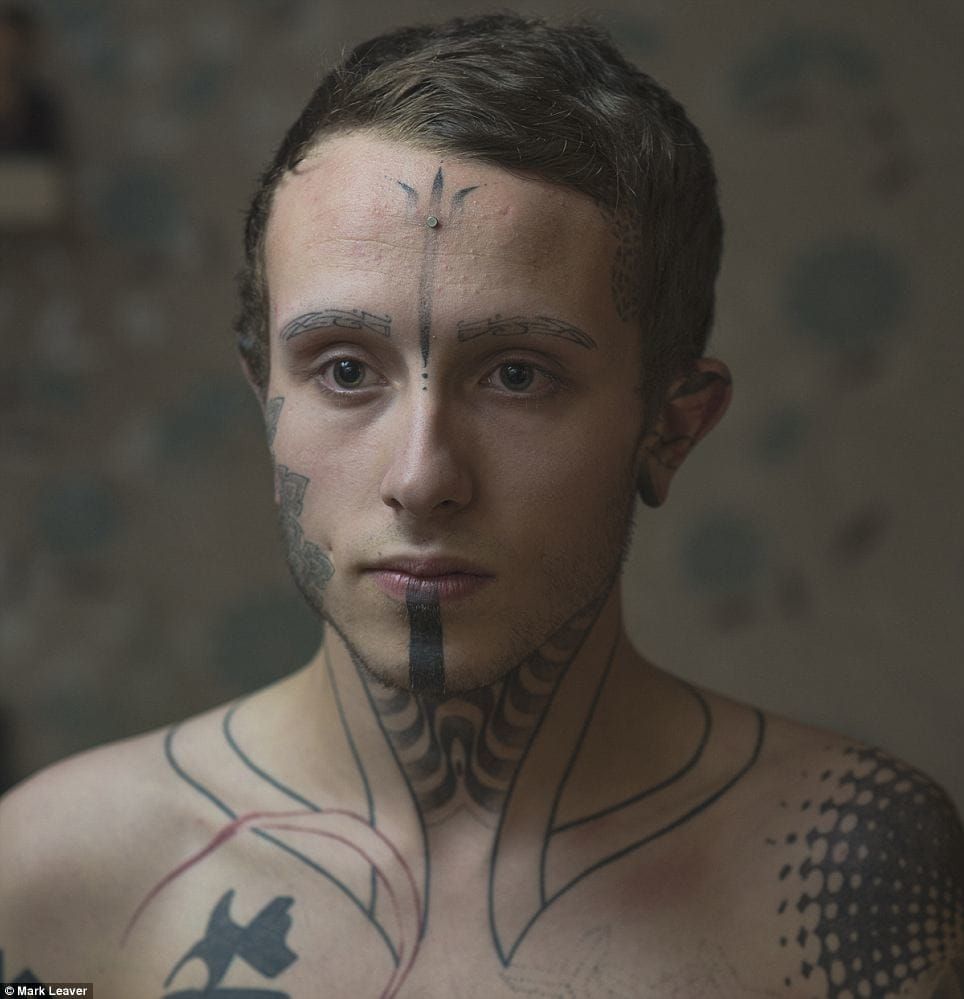
Popular Designs of Facial Tattoos
Facial tattoos can be intricate and beautiful works of art, or simple and understated. Some popular designs include:
Tribal Tattoos
Tribal tattoos are a popular choice for facial tattoos. They often feature bold, black lines and geometric patterns that symbolize strength and resilience.
Animal Tattoos
Animal tattoos are another common choice for facial tattoos. They can represent the wearer’s spirit animal or serve as a symbol of protection or power.
Religious Tattoos
Religious tattoos are also frequently seen on the face. They can be used to express devotion or as a talisman for protection.
Cultural Tattoos
Cultural tattoos reflect the wearer’s ethnic heritage and can include designs specific to their cultural identity.
How to Use the Meaning of Facial Tattoos
If you are considering getting a facial tattoo, it is important to consider the meaning behind the design you choose. Facial tattoos are highly visible and can have significant cultural and social implications. Before getting a facial tattoo, research the cultural significance of the design to make sure you understand its meaning and context.
Examples of Facial Tattoos
Facial tattoos are becoming more mainstream, and there are now many examples of celebrities and public figures with facial tattoos. Some well-known examples include:
- Post Malone, who has a barbed wire tattoo on his forehead
- Amber Rose, who has a portrait of her children on her forehead
- Mike Tyson, who has a tribal tattoo on his left eye
These examples show that facial tattoos can be both meaningful and stylish.
Comparisons of Facial Tattoos
Facial tattoos are not for everyone, and opinions about them vary widely. Some people see them as a powerful form of self-expression, while others view them as unprofessional or even offensive. However, it is important to remember that facial tattoos have a long history in many cultures and can hold deep cultural or spiritual significance.
Conclusion
Facial tattoos have a rich history and cultural significance in many societies. They can be beautiful works of art and powerful expressions of personal identity. However, it is important to understand the meaning behind facial tattoos and consider their social implications before getting one. By doing so, you can ensure that your facial tattoo is both meaningful and respectful of its cultural and historical context.

I am Harvey Berry, a tattoo enthusiast who has immersed himself in the diverse world of ink, passionately exploring the beauty and artistry within each tattoo. My mission extends beyond uncovering the aesthetics of tattooing; it involves sharing in-depth knowledge across all aspects of this art form.
Fueled by genuine curiosity and love for every facet of tattooing, I have diligently crafted well-researched articles, with a special focus on the Tattoo Meaning of Impeccable Nest section. Here, my aim is to help the tattoo community gain a deeper understanding of the meanings and values embedded in each tattoo.
One of my primary goals is to encourage responsible decision-making when it comes to getting inked. I recognize that choosing to get a tattoo is a significant personal decision that requires careful consideration. Hence, I provide diverse resources covering the meaning of tattoos, the tattooing process, aftercare tips, and other valuable information.
Whether you are a seasoned tattoo enthusiast or embarking on your first exploration of the world of body art, I aspire to be a reliable resource for you at every step of your journey. I hope that my extensive knowledge of tattoos, especially in the Tattoo Meaning section, will assist you in finding inspiration to express yourself through the art of tattoos.
